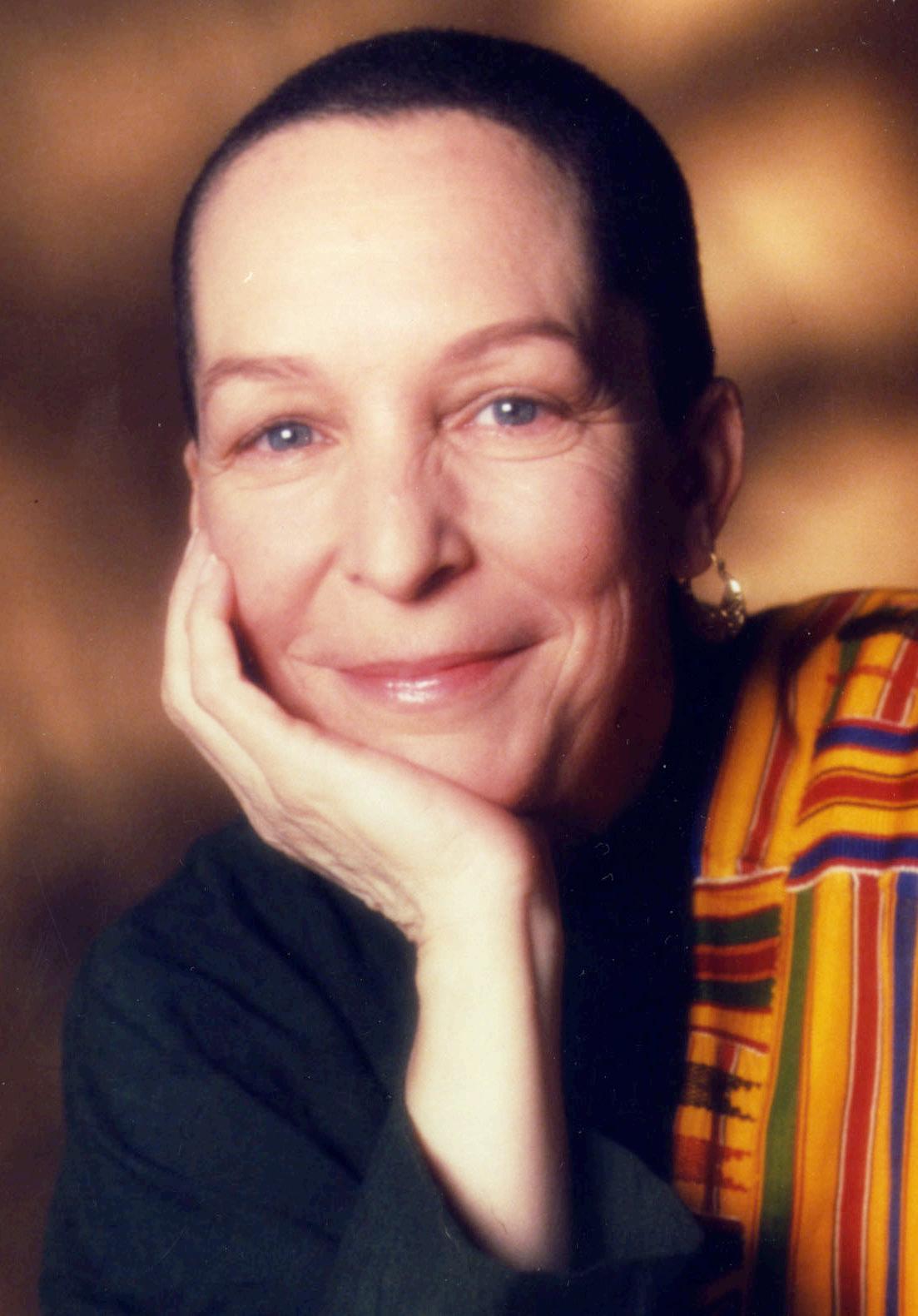
17 minute read
Board of Directors
PLAYWRIGHT PEARL CLEAGE
Pearl Cleage was born in 1948 in Springfield, Massachusetts, and grew up in Detroit, Michigan. Her father was a prominent minister and her mother was an elementary school teacher. An academically gifted student, Pearl enrolled at Howard University, where she studied playwriting and had two one-act plays produced. She left Howard in 1969 at the age of twenty to marry Michael Lomax, an Atlanta politician. Upon graduating in 1971 from Spelman College, Cleage worked at a number of media jobs including hosting a local, Blackoriented interview program as well as being director of communications for the city of Atlanta and press secretary for Mayor Maynard Jackson. Cleage divorced Lomax in 1979 and married Zaron Burnett Jr. in 1994.
Cleage gained national attention as a playwright in 1992 with Flyin’ West, which premiered at the Alliance Theatre in Atlanta and was subsequently produced at a number of regional theatres across the country (including the IRT in 1994). Blues for an Alabama Sky (IRT 2003) is set in 1930 as the creative euphoria of the Harlem Renaissance gives way to the harsher realities of the Great Depression. What I Learned in Paris (IRT 2015) is a comedy that mixes the personal with the political and the social, set in Atlanta during the 1973 election of Maynard Holbrook Jackson, the first African American mayor of a major southern city. Cleage’s other plays include Bourbon at the Border and A Song for Coretta. She wrote We Speak Your Names for Oprah’s 2005 Legends Ball, a celebration of 25 extraordinary African American Women. She has taught drama at Spelman College for many years.
Cleage’s first novel, What Looks Like Crazy on an Ordinary Day, was a 1998 Oprah Book Club selection, a New York Times bestseller, and a BCALA Literary Award winner. Her most recent is 2011’s Just Wanna Testify. Most of Cleage’s eight novels are set in Atlanta, and some characters recur from book to book.
Cleage has long contributed essays to national magazines such as Essence, the New York Times Book Review, Ms., and Black World. In 1990 and 1993 she published collections of her essays entitled, respectively, Mad at Miles: A Black Woman’s Guide to Truth, and Deals with the Devil andOther Reasons to Riot. In 2014 she published a memoir entitled Things I Should Have Told My daughter: Lies, Lessons, and Love Affairs. Frequently focused on topics concerning sexism and racism, Cleage writes on such issues as domestic violence and rape in the Black community, AIDS, and women’s rights. She speaks at colleges, universities, and conferences on these and other topics such as the role of the artist in wartime and the citizen’s duty in a participatory democracy.
“The purpose of my writing, often, is to express the point where racism and sexism meet.” - Pearl Cleage

In 1862 the Homestead Act was passed, allowing for citizens over 21 years of age to claim up to 160 acres of land. This program, of course, came at a cost to Indigenous tribes throughout the Midwest and Western regions of the United States. So first, I wish to acknowledge that these theatre seats rest on the ancestral lands of the Miami, Piankashaw, Wea, Potawatomi, Kickapoo, Delaware, and Shawnee.
More than a century after the Homestead Act, in 1993, playwright Pearl Cleage wrote Flyin’ West—a tale of the Old West seen through the visionary eyes of Sophie Washington, an African American settler in Nicodemus, Kansas, around the turn of the last century. The characters of Sophie and her two sisters, their elderly “auntie,” their self-loathing brother-in-law, and their loyal neighbor are fictitious. But Cleage’s story elements—struggling to make a home, the desire to protect family and legacy, the need to find love—resonate both with our shared American history and with our contemporary American life.
This iconic depiction of American life is told in the most American of genres: the Western. I grew up watching my father watch Westerns. Honestly, just this past Thanksgiving, there I was, popping into “Dad’s space” to hear the voice of Eric Fleming in Rawhide or, an hour later, the opening credits of Bonanza. Flyin’ West is melodramatic, funny, and the most American play I have ever directed. It transports us to a world that is American history. While the play is subtle in its conversation with history, it is an organic portrayal of the American belief in change and the American drive to stand up for what we believe in.
This fictional Western takes place in a very real place: the town of Nicodemus, Kansas. Settled by freed slaves in 1877, it was one of many Black communities established west of the Mississippi River after the Civil War. An almost mythical town to us these days, Nicodemus conjures images of endless plains, tumbleweeds, and a vast night sky with haunting echoes of a howling coyote or a distant train. Nicodemus is a great lens into the beautiful ugliness that is the genesis of any community. Flyin’ West shows us violence, gun use, and women making decisions without permission.
The women in Westerns are usually inspired by the Calamity Janes and Annie Oakleys of known history. But what of the brazen lives of other true characters of character who redefined the Old West? Western pioneers such as Mary Ellen Pleasant or Abby Fisher are historically fascinating, as are our beloved Stagecoach Mary or Bridget “Biddy” Mason.
Flyin’ West challenges the Western genre with this building of a Black town, challenges our societal assumptions about women, and challenges our vision of leadership in the middle of America.
From Left: Mary Ellen Pleasant (1815-1904) was an Underground Railroad agent who escaped capture by sailing to San Francisco, where she became an entrepreneur, financier, real estate magnate, and women’s advocate. Abby Fisher (1831-1915) published the second known cookbook by a Black woman in the United States, What Mrs. Fisher Knows about Old Southern Cooking, in San Francisco in 1881. Mary Fields (circa 1832–1914), also known as Stagecoach Mary, was the first African American woman mail carrier in the United States, delivering mail across 200 miles of Montana wilderness from 1895 to 1903. Bridget “Biddy” Mason (1818-1891) was a nurse, a real estate entrepreneur, a philanthropist, and one of the founders of the First African Methodist Episcopal Church in Los Angeles.
In 1877, W. H. Smith, an African American minister, and W. R. Hill, a White land developer from Indiana, formed the Nicodemus Town Company. Whether they named their new town for the Biblical figure or for a legendary African prince who was taken into slavery and later purchased his own freedom, they hoped to create a community where Black people could live in peace and prosperity. They located their community along the northern bank of the Solomon River, an area suitable for farming. Flyers touting the area’s resources and benefits were distributed across the South. By September of 1877, more than 300 Black pioneers had disembarked from the closest train station in Ellis, Kansas, and had walked the 35 miles to Nicodemus. A lack of timber forced early settlers to live in sod huts. Those without horses and farm equipment had to work with hand tools. Nonetheless, by 1880 Nicodemus had a population of 600 served by a local bank, two hotels, three churches, three general stores, a pharmacy, and a newspaper. By 1887, the town had a literary society, a baseball team, a band, and an ice cream parlor. When a plan to bring the railroad to Nicodemus failed, however, businesses began to close, and the population began to dwindle. The Great Depression and the Dust Bowl brought further challenges, and today Nicodemus has a population of only 20. Nonetheless, Nicodemus, Kansas, is the only remaining Western community established by African Americans after the Civil War.
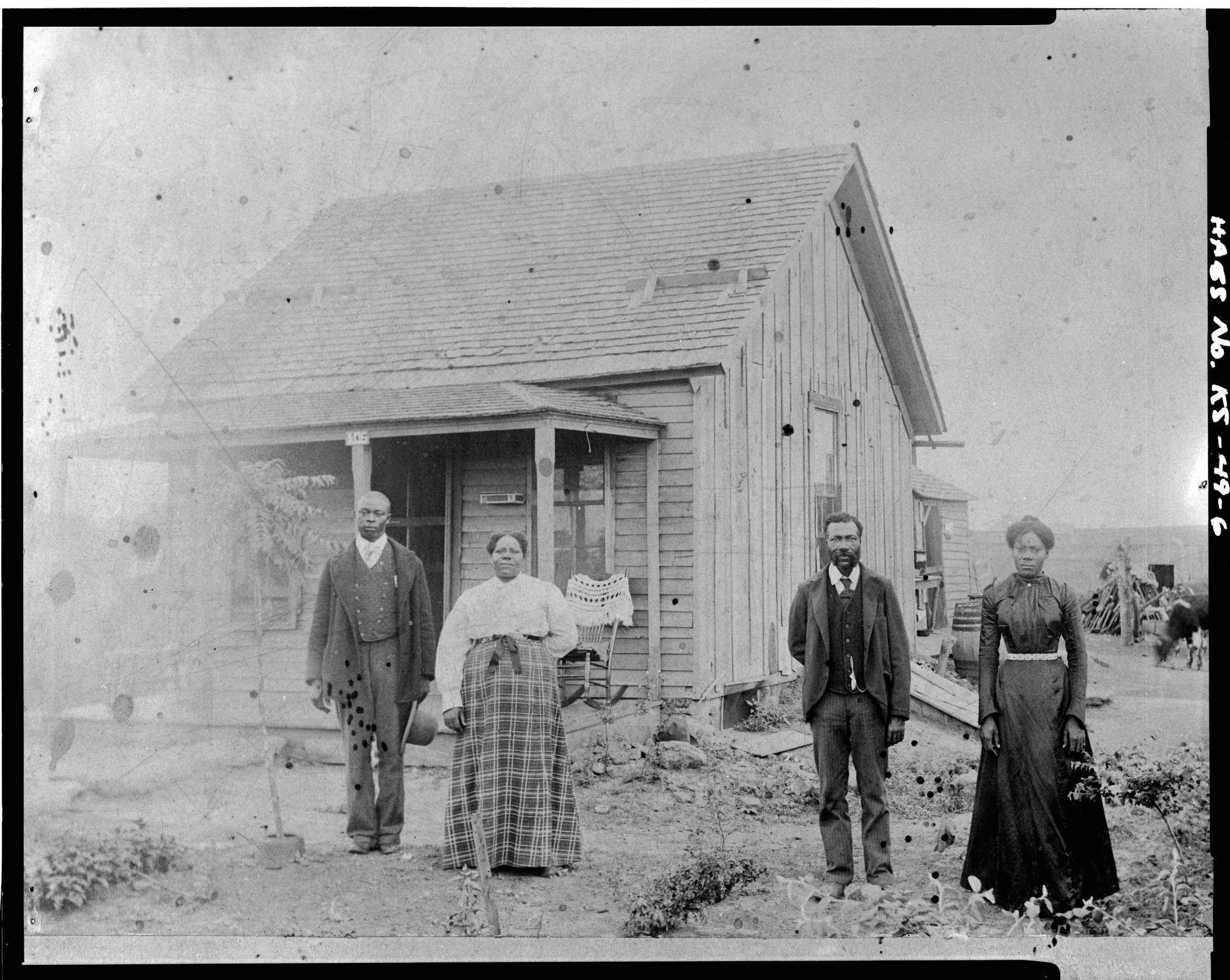


Because we are free women, born of free women, who are born of free women, back as far as time begins, we celebrate your freedom. Because we are wise women, born of wise women, who are born of wise women, we celebrate your wisdom. Because we are strong women, born of strong women, who are born of strong women, we celebrate your strength. Because we are magical women, born of magical women, who are born of magical women, we celebrate your magic. My sisters, we are gathered here to speak your names. We are here because we are your daughters as surely as if you had conceived us, nurtured us, carried us in your wombs, and then sent us out into the world to make our mark and see what we see, and be what we be, but better, truer, deeper because of the shining example of your own incandescent lives. We are here to speak your names because we have enough sense to know that we did not spring full blown from the forehead of Zeus, or arrive on the scene like Topsy, our sister once removed, who somehow just growed. We know that we are walking in footprints made deep by the confident strides of women who parted the air before them like the forces of nature that you are. We are here to speak your names because you taught us that the search is always for the truth and that when people show us who they are, we should believe them. We are here because you taught us that sisterspeakcan continue to be our native tongue, no matter how many languages we learn as we move about as citizens of the world and of the ever-evolving universe. We are here to speak your names because of the way you made for us. Because of the prayers you prayed for us. We are the ones you conjured up, hoping we would have strength enough, and discipline enough, and talent enough, and nerve enough to step into the light when it turned in our direction, and just smile awhile. We are the ones you hoped would make you proud because all of our hard work makes all of yours part of something better, truer, deeper. Something that lights the way ahead like a lamp unto our feet, as steady as the unforgettable beat of our collective heart. We speak your names. We speak your names.
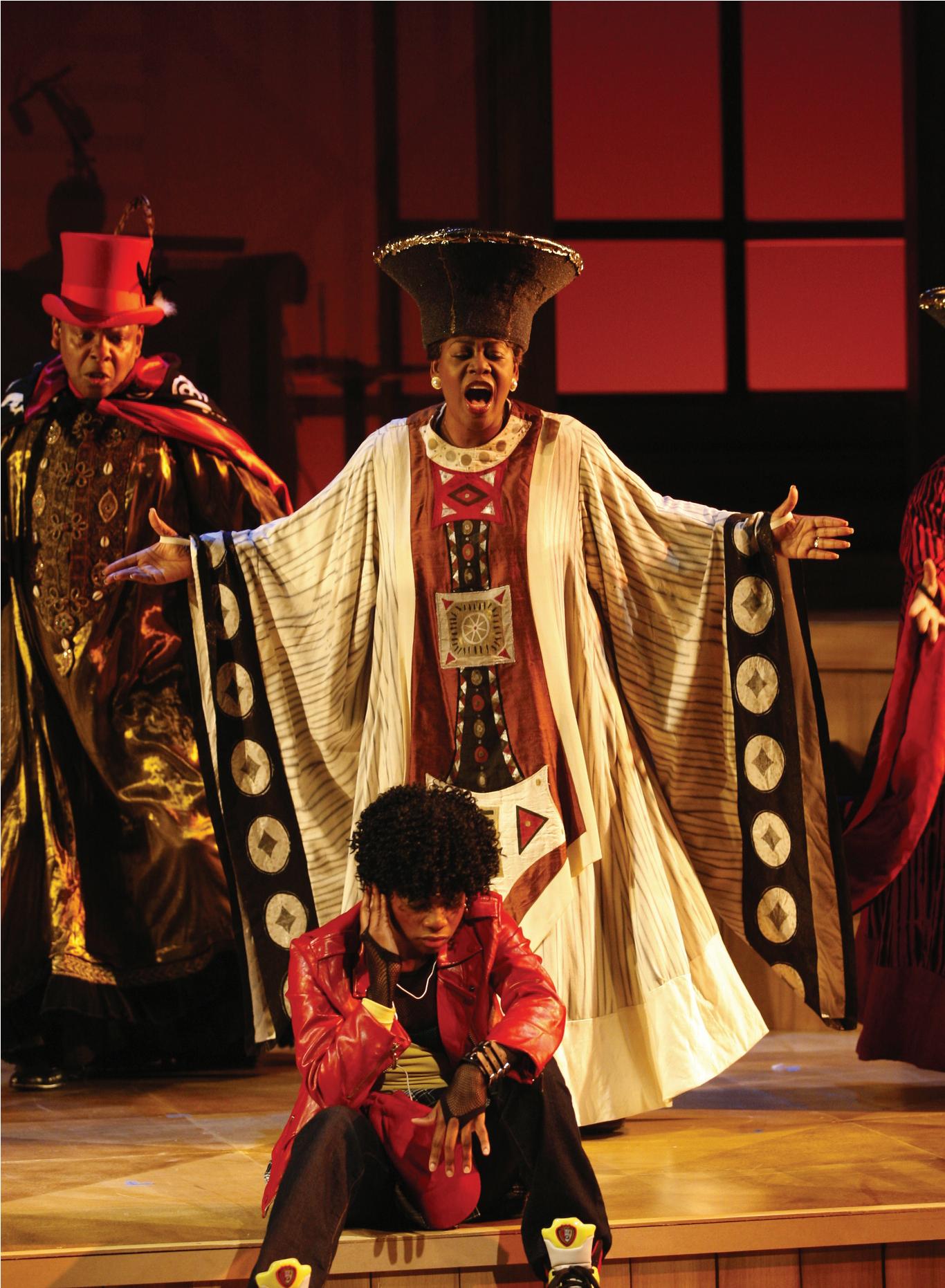
HELP BRING THE CLASSROOM TO LIFE FOR STUDENTS ACROSS THE STATE THROUGH LIVE THEATRE!
Experiencing a world class, professional, IRT production at a young age inspires creative thinking, teaches important social skills about emotional cognition, and increases tolerance for others. Your gift to the Alan & Linda Cohen Education Fund will provide students experiences that embolden, empower, and enrich their education and growth.
EXCERPTS FROM FIVE DECADES OF WONDER: INDIANA REPERTORY THEATRE BY DONNA L. REYNOLDS

Dean Biasucci & Michael Lipton in Julius Caesar, 1990. Connie Oates & David Alan Anderson in Tales from Olympus, 1991.
1990’s production of Shakespeare’s Julius Caesar, featuring Michael Gross of TV’s Family Ties and Indianapolis Colts place kicker Dean Biasucci, garnered an audience of more than 23,000, breaking all previous box office records.
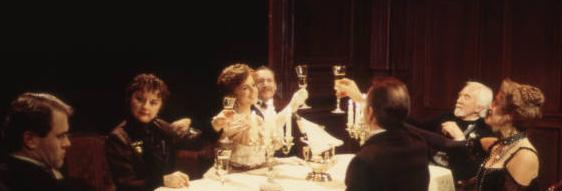

The company of The Magnificent Ambersons, 1996. The 1990-91 season saw the introduction of a program, long in the planning stages, called the Junior Works series of three plays specifically for junior high and high school audiences. It embraced a new age group of theatregoers and allowed IRT to reopen the Upperstage to active production and to establish a young, multicultural company of local professional actors.
The IRT’s 25th season opened with a world premiere based on Hoosier author Booth Tarkington’s book The Magnificent Ambersons, set in Indianapolis. New artistic director Janet Allen was especially pleased to be “celebrating the life of this wonderful writer on the fiftieth anniversary of his death” with a play written by another Hoosier, James Fesuk-Geisel.
Tom Haas.
When playwright James Still agreed to join IRT’s artistic director, Janet Allen, in 1997 to apply for a grant that would fund a playwright-in-residence position, they both thought it would be a two-year experience. Then the role expanded and became a permanent part of the IRT budget, and that partnership has endured for 25 years, which testifies to both Still’s prodigious talents and the IRT audience’s love for his work. A Midwesterner by birth and at heart, Still has resided in other parts of the country and worked internationally, but his understanding of and telling of Indiana-centered stories always rings true. On the morning of January 28, 1991, Artistic Director Tom Haas left his home to go jogging in a cold fog, and never returned. He was hit by a van and rushed to a hospital, unconscious, but because he was not carrying identification, no one was immediately notified. Joel Grynheim, the Theatre’s production stage manager at the time, had been boarding at Haas’s house and had gone to work, unaware that Haas was injured. For a few hours, Haas’s absence from both home and work raised no alarms. But early that afternoon, Grynheim and his young son heard a radio report that an unidentified man, injured in a jogging accident, was at a local hospital, and authorities were asking for help identifying him. Thunderstruck, the two raced to the hospital. Once stabilized and showing some improvement, Haas was transferred in February from the neurological critical care unit to a rehabilitative unit. But on Thursday morning, February 21, Haas died of a pulmonary embolism, the result of his injuries. IRT regular Scott Wentworth joined Janet Allen to co-direct Hedda Gabbler, which Haas had been scheduled to direct. Wentworth recalled Allen saying, “We’re the grown ups now,” with a sense for both of them that this passing of the IRT artistic torch was a coming-of-age experience in the worst possible way.
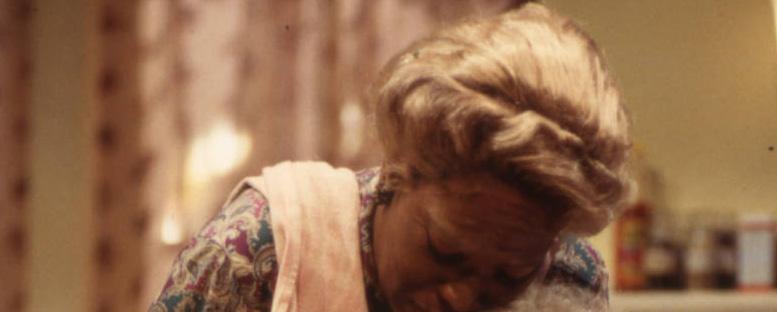
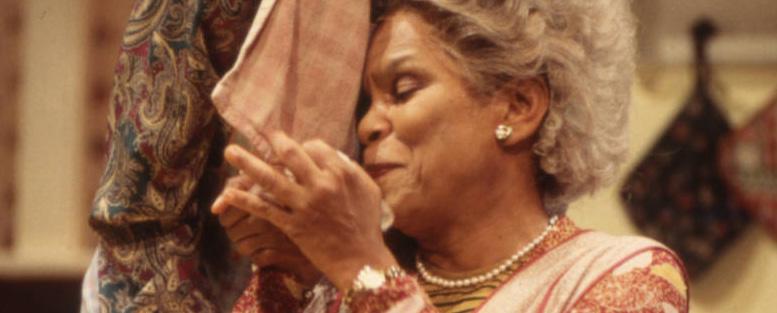
Saidah Arrika Ekulona & Brenda Thomas in Having Our Say on the Upperstage, 1998.
During her third year as artistic director, Libby Appel had temporary platforms built in the wings of the Upperstage for audience seating, reconfiguring the Upperstage from a proscenium space to a thrust space. In 1997, a complete renovation of the Upperstage made this arrangement permanent.

Tickets ON SALE NOW!

FRIDAY, FEBRUARY 10, 2023
The IRT Celebrity Radio Show is the Indiana Repertory Theatre’s annual fundraising event, an evening that celebrates and raises money to support what the IRT does best—putting together a night of high quality theatrical entertainment. Featuring a show cast with local business leaders and celebrities that will keep you in stitches, those Fabulous Torts will continue to sing the night away, and a silent auction that you will want to bid early and bid often on – it is a night you won’t want to miss!


50th Season Book
50th Season Puzzle
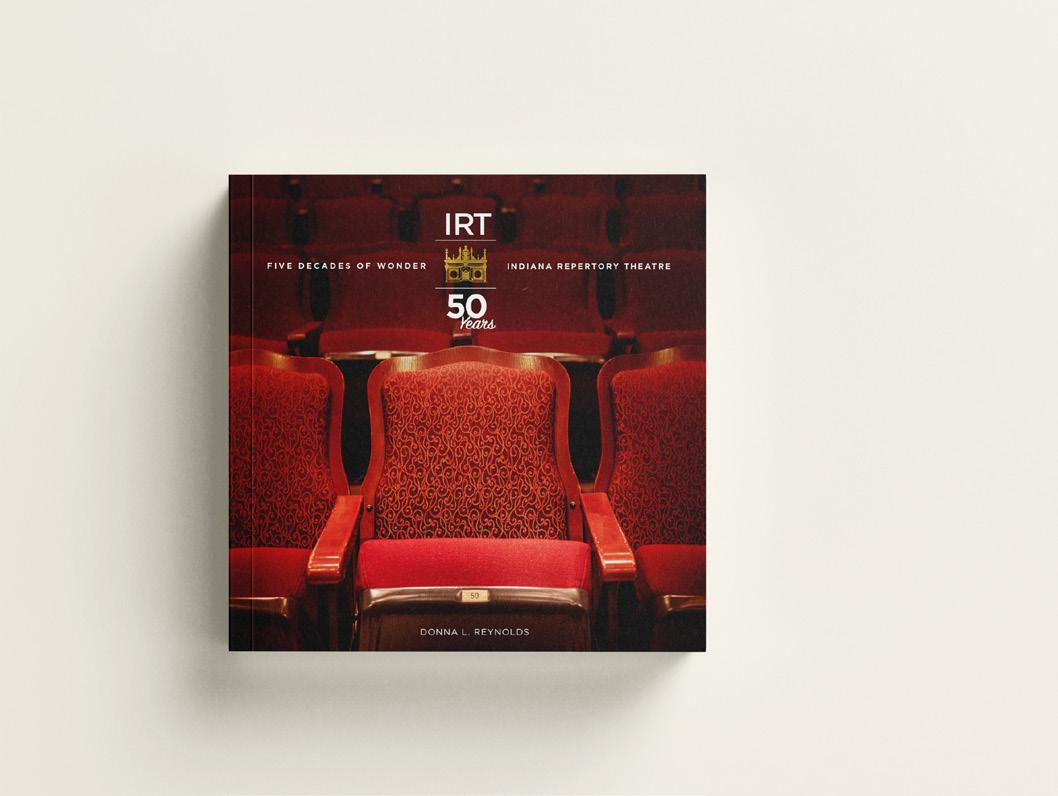

Explore the history of the IRT in this beautifully curated book written by Donna L. Reynolds.
Take a piece (or 1000!) of the IRT home with this puzzle featuring covers of our programs over the years!


KAYLA MARY JANE | MINNIE DOVE CHARLES
Kayla is earning her B.F.A. in Drama at the Tisch School of the Arts. She is a proud CanadianAmerican actress of Jamaican descent and has a passion for projects that engage her artistic integrity, such as her roles in some of her favorite productions: Hopetown, How Black Mothers Say I Love You, and Marie Antoinette and the Magical Negroes. She has had training in the Meisner Studio, Practical Aesthetics at the Atlantic Theatre Company Acting School, and OnCamera Acting techniques at the Stonestreet Studio.
ENOCH KING | WIL PARISH
Enoch is excited to make his IRT debut. Recent credits include Chicken and Biscuits(Dominion Entertainment), The Light (Horizon Theatre), Toni Stone (Alliance Theatre—Suzi Bass Award for Outstanding Featured Performer), The Bluest Eye (Synchronicity Theatre), It’s a Wonderful Life and Skeleton Crew (American Stage), Paradise Blueand Skeleton Crew (True Colors Theatre), Hands of Color(Synchronicity Theatre—Suzi Bass Award for Best World Premiere), A Christmas Carol (Shakespeare Tavern), Between Riverside and Crazy and A Raisin in the Sun(American Stage, St. Petersburg, Florida), and The Christians (Actors Express—Suzi Bass Award for Best Supporting Actor). Enoch can currently be seen on TV and film in Atlanta, Till, and The Last Days of Ptolemy Grey. “Shout out to the Tribe of 5. Manifest!”
DWANDRA NICKOLE LAMPKIN | MISS LEAH
Dwandra is thrilled to be returning to the Indiana Repertory Theatre. Prior IRT credits include Doubt and To Kill a Mockingbird, as well as NO. 6, which she directed. Dwandra holds an M.F.A. in Acting from the National Theatre Conservatory and is an Associate Professor of Acting at Western Michigan University. She has worked regionally at the Denver Center Theatre Co., the Huntington Theatre in Boston, the Human Race Theatre in Dayton, and the National Black Theatre in NYC. Some of her television credits include Law and Order, Third Watch, Law and Order: SVU, and the critically acclaimed ABC series Wonderland. Dwandra has also written a one-woman show entitled The Conviction of Lady Lorraine. For booking information, visit her website dwandra.com
L’OREAL LAMPLEY | FANNIE DOVE
L’Oreal is honored to be making her debut at Indiana Repertory Theatre. Theatre credits include the Public Theater’s For Colored Girls(Lady in Blue, u/s) and Coriolanus (Ensemble), an audio play of The Tempest (Miranda) with Resounding Live, and Trinity Rep’s Othello (Bianca). Education: Brown/Trinity Rep M.F.A. Acting. “All glory to God! For Sarah, Jeri, Angela, Lineth, Kamiyah, Shenyse, and Ashley.”

Flyin’
West
by Pearl Cleage
LAKESHA LORENE | SOPHIE DOVE
LaKesha is an actress, producer, and creative entrepreneur. A passionate artist, her work spans into arts administration as owner of a film production company, Loving Life Productions LLC; founder of Indy’s first Black Equity theatre, Naptown African American Theatre Collective; and Marketing & Community Engagement Coordinator for the Indianapolis Shakespeare Company. Her recent stage credits include Elizabeth in Ricky 3—A Hip Hop Shakespeare Richard III; No AIDS, No Maids, a one-woman show; and IRT’s NO. 6. “My work in entertainment is a lifelong dream that I feel blessed to live out on a daily basis. Sending big love to Janet, Ben, and Raelle for trusting me with this important story! And thank you to God, friends, and family for all the support!” @thereallakeshalorene
ALLEN TEDDER | FRANK CHARLES
Indiana Repertory Theatre Debut. Allen’s other professional credits include Broadway: To Kill a Mockingbird (Guitarist); Off Broadway: King Lear (Delacorte Theater); The Alchemist (Red Bull Theater); Regional: PlayMakers Repertory Company. Training: UNC Chapel Hill, the Juilliard School. Allen is from North Carolina. “I am very grateful to have made it onto the stage here at the Indiana Repertory Theatre with these great artists. I am glad to be working with Indiana Repertory Theatre.”
RAELLE MYRICK-HODGES | DIRECTOR
Raelle directed Pipeline at the IRT and has also worked at the Magic Theatre, Public Theater, National Black Theatre, and Atlanta Shakespeare Company, among others. A self-taught theater artist with no arts degree, she is a master teacher/adjunct professor with Actor’s Studio, Atlantic Acting School, Pace University, and Brown University, and she recently finished an artist residency with Cornell University. Recent work includes an all-non-binary Coriolanus adapted by Sean San José for UNCSA, and He Has the Prettiest Handwriting, a work-inprogress about Raelle and her dad’s joyous relationship. Raelle will next be working with Pulitzer Prize–winning playwright James Ijames on his adaptation of Medea in collaboration with Bryn Mawr College. “I dedicate this production to my father Ray Hodges—he loves himself a good Western!”





